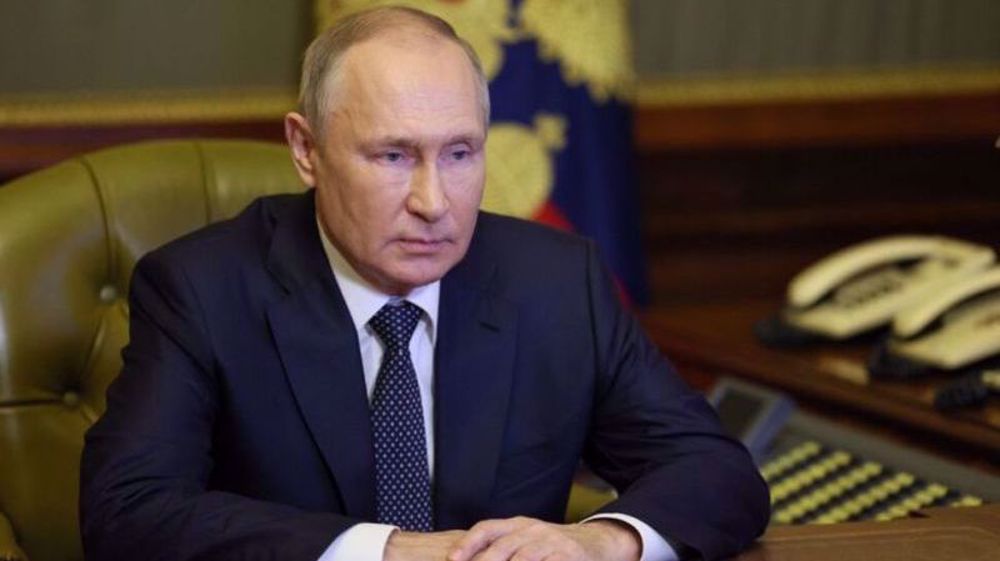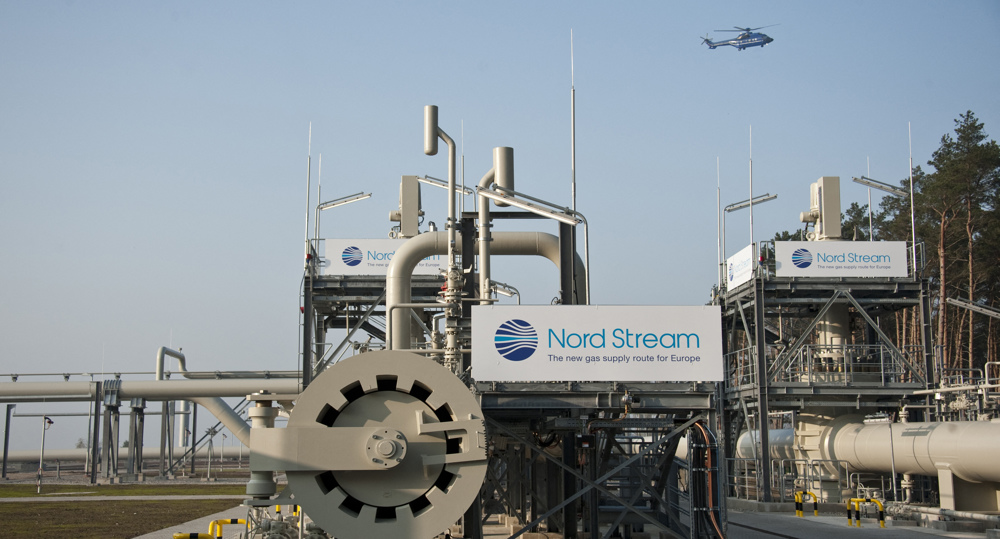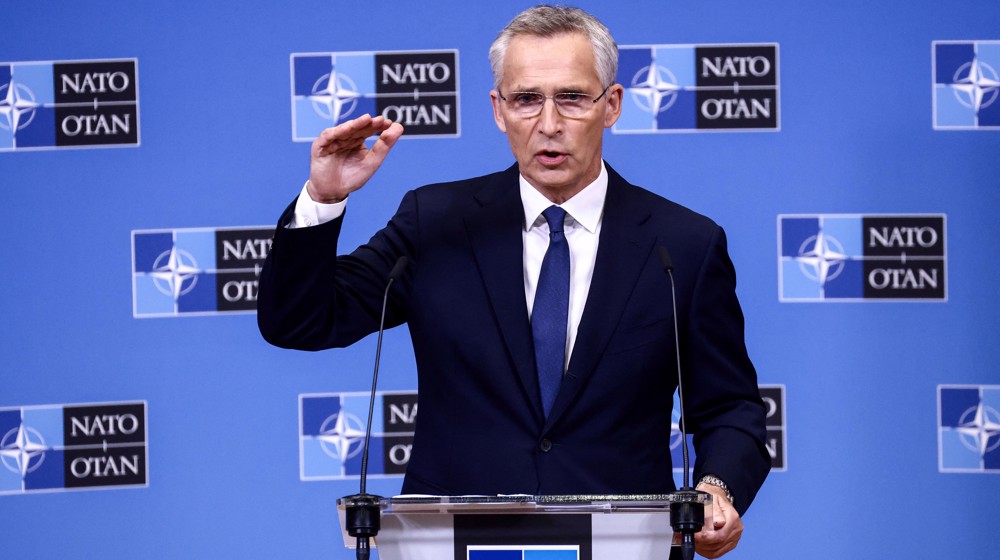Putin calls Nord Stream sabotage ‘act of intl. terrorism’, says ready to resume supply
Russian President Vladimir Putin on Wednesday termed the sabotage of the Nord Steam gas pipeline as an “act of international terrorism,” saying Moscow is ready to resume gas supplies to Europe but the "ball is in EU's court".
Speaking at the Russian Energy Week forum in the capital Moscow, Putin blamed the recent act of sabotage on the United States, Ukraine, and Poland, and also other alternative energy suppliers that stand to benefit the most from the attack on Nord Stream 1 and 2 natural gas pipelines.
“The act of sabotage of the Nord Stream 1 and 2 is an act of international terrorism aimed at undermining energy security of the entire continent by blocking supplies of cheap energy,” the Russian president said.
“Those who want to rupture ties between Russia and the European Union are behind the acts of sabotage on the Nord Stream.”
His comments came just a day after a pipeline that carries Russian oil through Poland was found to be leaking. Poland said investigations into the incident would continue but it assumed that it was an accident.
At the end of September, attacks on two strings of Nord Stream and one string of Nord Stream 2 also caused a massive gas leak, putting them out of service and raising concerns over the future of Europe’s gas supplies.
The pipelines, operated by Russian gas giant Gazprom, are currently not in operation, but they both still contain gas. Deliveries of Russian gas to Europe have slumped following a deterioration of relations between Russia and some European countries over Moscow’s military operation in Ukraine that began on February 24.
Unlike Nord Stream 1, the Nord Stream 2 pipeline has never brought natural gas to Europe because Germany prevented the flows from ever starting just before Russia launched its military operation in Ukraine.
Putin also warned the attacks set “the most dangerous precedent.”
“It shows that any critically important object of transport, energy or utility infrastructure is under threat” irrespective of where it is located or by whom it is managed," the Russian leader said.
Putin also stated that the US, in the wake of the sabotage, would have an opportunity to push more liquefied natural gas (LNG), a fuel inferior to Russian pipeline gas due to its higher price, on Europeans.
The US and its allies have rejected Moscow’s allegations, claiming instead that Russia may have been behind the underwater blasts in the Baltic Sea.
Prior to the blasts, Russia had cut off the parallel Nord Stream 1 pipeline, blaming technical problems for the stoppage, which have caused prices in the EU to soar, driving inflation, and pressuring governments to help ease the pain of sky-high energy bills for households and businesses.
Ready to resume gas supply
Elsewhere in his remarks on Wednesday, Putin said Moscow was ready to resume gas supplies to Europe via a link of the Germany-bound Nord Stream 2 pipeline under the Baltic Sea.
He said Moscow could ramp up the capacity of its gas exports to Turkey and eventually turn into a hub for gas supplies to Europe. Putin, however, denounced Western plans to cap prices for Russian energy exports. “Russia won’t act against common sense and pay the other’s welfare.”
“We won’t supply energy to the countries that would cap the prices. I would like to warn those, who instead of business partnership and market mechanisms try to use con tricks and blunt blackmail, that we won’t do anything to our own detriment,” the Russian leader said.
He went on to say that Russia has nothing to do with the soaring energy prices in Europe, instead blaming the West for stoking a global energy crisis.
It was the poorest countries that would pay the highest price in terms of rising energy costs, the Russian leader added.
Moscow slams West for ‘provocative’ nuclear rhetoric
In separate remarks on Wednesday, Kremlin spokesman Dmitry Peskov censured Western leaders for engaging in “provocative” nuclear rhetoric following a series of warnings from Russia, the US and NATO on the dangers of escalating the Ukraine conflict into a nuclear war.
On September 21, Putin warned the West that he was not bluffing when he said he would be ready to use nuclear weapons to defend Russia against “nuclear blackmail” from major Western powers.
US President Joe Biden, however, doubted that the Russian leader would use a tactical nuclear weapon in Ukraine. Biden has already warned that the world faced the biggest risk of nuclear Armageddon since the 1962 Cuban Missile Crisis.
“We express our daily regret that Western heads of state, in the United States and Europe, engage in nuclear rhetoric every day. We consider this a very harmful and provocative practice,” Peskov said in an interview with CNN.
Next week, NATO will be proceeding with its long-planned nuclear preparedness exercise, dubbed “Steadfast Noon.”
The exercise will be held annually and will continue for about a week. Secretary-General Jens Stoltenberg of NATO said on Tuesday the drills involve fighter jets capable of carrying nuclear warheads, but do not involve any live bombs.
Elsewhere in his remarks, Peskov said comments by Stoltenberg, who said if Putin wins the war, it would be a defeat for the West, revealed that the US-led military alliance was essentially fighting on Ukraine’s side.
NATO, partners aim to boost Ukraine’s military capabilities
On Wednesday, over 50 countries convened in Brussels on the sidelines of a NATO meeting to discuss bolstering Ukraine's air force. The gathering is the biggest NATO meeting since four Ukrainian regions joined the Russian Federation through a referendum.
“We need different types of air defense - short-range, long-range, air defense systems to take ballistic missiles, cruise missiles, drones, different systems for different tasks,” Stoltenberg told reporters upon arrival for the meeting.
He said allies also needed to scale up the supply of air defense systems to aid Ukraine “defending” even more cities.
Stoltenberg’s comments came a day after Germany reportedly provided Ukraine with the first of four IRIS-T SLM air defense systems that Berlin had promised to supply.
NATO defense ministers will first meet with partners of the Ukraine Defense Contact Group, a body founded on the initiative of the US to keep up arms supplies to Kiev.
Stoltenberg said NATO had not seen any changes in Russia’s nuclear posture. “But we will remain vigilant, we will continue to monitor closely because the nuclear threats, the nuclear rhetoric, and the veiled threats from Russia are dangerous and reckless.”
The NATO chief also pledged to boost the protection of critical infrastructure, saying the alliance had already doubled its presence in the Baltic and North Seas to more than 30 ships supported by aircraft and undersea activities.
Since Russia launched its military operation in Ukraine in late February, the United States and its European allies have imposed waves of economic sanctions against Moscow, while supplying large caches of heavy weaponry to Kiev.
Moscow has been critical of the weapons supplies to Kiev, warning it will prolong the conflict, which is now in its eighth month.
‘Ghost town’: 70% of Jabalia buildings destroyed by Israel
Mother’s Day: Sareh Javanmardi’s inspiring journey as Paralympic champion and mother
Russia downs over 40 Ukrainian drones as Putin vows 'destruction' on Kiev
VIDEO | Yemen: A bone in Israeli neck
D-8’s role in Iran’s economy after Cairo summit
China slams US as ‘war-addicted’ threat to global security
China ‘firmly opposes’ US military aid to Taiwan
VIDEO | Press TV's News Headlines












 This makes it easy to access the Press TV website
This makes it easy to access the Press TV website